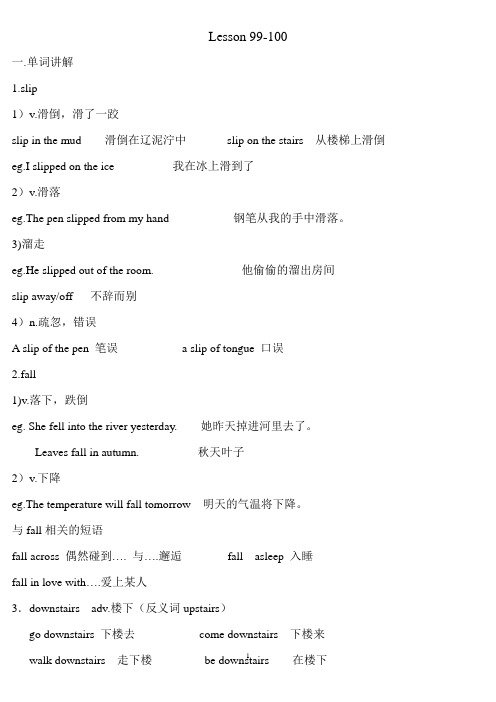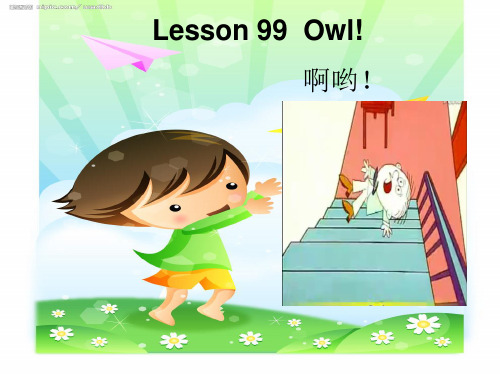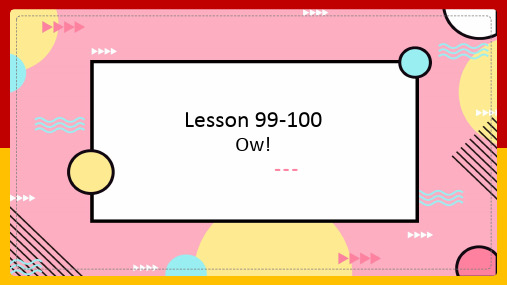新概念英语第一册99--100课
新概念英语1 lesson99-100知识点

Lesson 99-100一.单词讲解1.slip1)v.滑倒,滑了一跤slip in the mud 滑倒在辽泥泞中slip on the stairs 从楼梯上滑倒eg.I slipped on the ice 我在冰上滑到了2)v.滑落eg.The pen slipped from my hand 钢笔从我的手中滑落。
3)溜走eg.He slipped out of the room. 他偷偷的溜出房间slip away/off 不辞而别4)n.疏忽,错误A slip of the pen 笔误 a slip of tongue 口误2.fall1)v.落下,跌倒eg. She fell into the river yesterday. 她昨天掉进河里去了。
Leaves fall in autumn. 秋天叶子2)v.下降eg.The temperature will fall tomorrow 明天的气温将下降。
与fall相关的短语fall across 偶然碰到…. 与….邂逅fall asleep 入睡fall in love with….爱上某人3.downstairs adv.楼下(反义词upstairs)go downstairs 下楼去come downstairs 下楼来1walk downstairs 走下楼be downstairs 在楼下5.hurt1)v.伤eg.It hurt my back. 它伤了我的背。
2)v. 伤害感情(心灵上或思想上的伤害)eg.I feel hurt . 我感到受了伤害3)v.疼痛eg.Does it hurt? 痛吗6.back1)n.背,背部lie on one’s back 面朝天地躺着/摔倒fall on one’s back 面朝天地躺着eg.I back hurts . 我的背部痛2)n.背面the back of hand 手背3)n.后面,后部eg.There are two students at the back of the classroom. 教室的后面有2名学生4)adv.在后,向后stand back 向后站回原处go back to …回到…. come back to….回来到….put these book back 把书放回原处7.stand up 起立,站起来sit down 坐下stand on one’s head 倒立stand on one’s own feet 独立,不依赖别人,自食其力stand behind 做…后盾,支持…. stand up to….经受住,勇敢面对stand well with 与…和睦相处8.help1)v.帮助2eg.Can I help you?(餐馆:您要吃点什么?商店:您要买点么?)We need your help. 我们需要您的帮助。
新概念英语第一册99-100课课件

• 有人往地上扔了个香蕉皮,我就因为这个 香蕉皮摔倒了。
Lesson 99 Ow!
单词学习
• ow • slip(slipped, slipped) • fall(fell, fallen) 天 • downstairs • hurt(hurt, hurt) • back • stand up • help • at once • sure • X-ray int. 哎呦 v. 滑到,滑了一脚 v. 落下,跌倒; n. 秋 adv. 下楼 v. 伤, 伤害, 疼痛 n. 背 起立,站起来 v. 帮助 立即 adj. 一定的,确信的 n. X光透视
10/29/2013
• back
• • • • • • • • • 1) n. 背,背部 我的背部痛 My back hurts. 2)n. 背面 the back of the hand 手背 3)n. 后面,后部 教室的后面 the back of the classroom.
• • • • • •
• • • • • • •
try doing 试着… 他试着把真相告诉他的妈妈。 He tries telling his mother the truth. Let sb do sth 让某人做某事 放 开他,让他走。 Let him go. I’m sorry, Lucy. I’m afraid that I can’t get up. • 我恐怕会迟到。 • I’m afraid that I will be late. • 恐怕明天会下雨。
新概念一 Lesson 99--100

Lesson 99 Ow!ow int. 哎呦slip(slipped, slipped)v. 滑到,滑了一脚① v. 滑倒She slipped and fell down on the wet stones.② v. 滑落;脱落The soap slipped out of her hand. 肥皂从她的手上滑落。
③ v. 下滑;下跌Profits continue to slip this year. 利润今年呈持续下跌趋势。
④ v. 遗忘;忽略Our wedding anniversary completely slipped my mind.我把我们的结婚纪念日忘得一干二净。
fall(fell, fallen)v. 落下,跌倒; n. 秋天downstairs adv. 下楼(upstairs 上楼)hurt(hurt, hurt)v. 伤,伤害,疼痛① v. 弄痛;使受伤He fell off the bicycle and hurt his leg.② v. 危害;损害The case has hurt his reputation. 那个案件损害了他的声誉。
I don't mean to hurt you. 我本无意伤害你的感情。
back n. 背stand up 起立,站起来help v. 帮助① v. 帮助;援助;救助He devoted his life to helping the disabled.他付出一生的心血帮助那些残疾人。
help sb. do sth. / help sb. to do sth. 帮助某人做某事help each other 彼此帮助② v. 对......有帮助;对......有好处My knowledge of French helped me a lot while I was travelling in France.我在法国旅行时,我的法文知识帮了我大忙。
新概念英语第一册lesson99-100

Comprehension:
Ask individual students questions. Students give natural answers 1 T: What did Andy do? S: He slipped and fell downstairs. 2 T: Has Andy hurt himself? S: Yes, he has. 3 T: Does he think he's hurt his back? S:Yes, he does.
Asking questions: Ask me if … 1 T: Andy slipped downstairs. S: Did Andy slip downstairs? T: How ⋯ ? S: How did Andy slip downstairs?
2 T: Ask me if Andy hurt himself. S: Did Andy hurt himself? T . How ⋯ ? S: How did Andy hurt himself?
Let’s have a test.
ቤተ መጻሕፍቲ ባይዱ
C 1. Are you interested in _____? A. how did he do it B. he did it how C. how he did it D. he how did it D 2. I don’t know _____. Can you tell me? A. how the two players are old B. how old are the two players C. the two players are how old D. how old the two players are 3. What did the scientist say? B He said he wondered if _____ into space by spaceship one day. A. he had to fly B. he could fly C. can he fly D. could he fly
新概念第一册Lesson99-100

★ hurt [hə:t] ( hurt, hurt) v.伤,伤害,疼痛 • 1) v. 伤 • Have you hurt yourself? • 你伤到自己了吗? • Does it hurt? 痛吗?
• • • • •
2)v. 伤害感情 (尤指思想、心灵) You hurt my heart. 你伤我心了 I feel hurt . 我感到受了伤害
LUCY:Have you hurt yourself? ANDY:Yes, I have. I think that I've hurt my back.
LUCY:Try and stand up. Can you stand up? Here. Let me help you
ANDY:I'm sorry, Lucy. I'm afraid that I can't get up.
• 5.从句中有or not时。 • I don’t know whether or not it rains.
宾语从句的分类:
• 1.作动词的宾语: • say, think, believe, hope, know, understand, suppose等 • Everyone knows that he is a good student. • 2.作介词的宾语: • This depends on how hard you work. • 3.作形容词的宾语: • 描写感情的形容词后,如afraid, sure, sorry,glad等 • They are afraid that they are wrong.
2.语序: 一定要使用陈述语序。 He knows what he should do next.
新概念英语第一册Lesson+99-100课件

Lily
Lily says that she has got a cold.
What’s the matter with you? I have got a fever.
Mary Mary says that she has got a fever.
What’s the matter with you?
Take an aspirin.
OK.
Lucy
Lucy has got a headache.
Doctor asks Lucy to take an aspirin.
Take some medicine.
OK.
Lily has got a cold. Lily
Doctor asks Lily to take some medicine.
PRACTICE
The boy says “I have got earache.”.
The boy says __h_e__h_a_s__g_o_t_e_a__ra_c_h_e__________.
The children say “ We have got toothache.”.
The children say __th__e_y_h_a__v_e_g_o_t__to_o_t_h_a_c_h_e______.
间接引语 宾语从句
I ask what Lucy has got.
I ask, “What has Lily got?”
I ask what Lily has got.
I ask, “What has Mary got?” I ask what Mary has got.
I ask, “What has Robert got?” I ask what Robert has got.
新概念英语第一册Lesson99-100!课件

Open your book and finish Part B on page 204.
Let's listen to the tape and repeat!
He says that he needs a haircut.
What do they want ? I think that they want some food.
They say that they want some money.
What will he do? I believe that he will buy the house.
--fall asleep 入睡 • 他刚要睡着,门铃响了。 • He is just falling asleep, The doorbell rang. • --fall in love with… 爱上某人 • 她对他一见钟情。She fell in love with him at the first sight. • downstairs adv. 楼下 反义词upstairs • --go downstairs 下楼去 --be downstairs 在楼下 • hurt • 1) v. 伤 • 他的女儿从自行车上捽了下来,伤到了背部。 • His daughter fell off the bike and hurt her back. • 2)v. 伤害感情 • I feel hurt. 我感到受到了伤害。(尤指思想、心灵) • 3)v. 疼痛 • Does it hurt? 痛吗?Yes, it hurts.
新概念英语第1册第99-100课课重点语法

新概念英语第1册第99-100课课重点语法第99-100课的内容:一、重要句型或语法1、宾语从句1)用来作宾语的句子叫做宾语从句,如:I think that I've hurt my back. / I'm afraid that I can't stand up. / I'm sure that you need an X-ray.2)本课出现了特殊的宾语从句,即间接引语的内容。
所谓间接引语就是指被转述的话,如:The doctor says that he will come at once.2、半情态动词needneed既可以作情态动词(没有人称和时态的变化,后面直接跟动词原形),也可以作行为动词(有人称和时态的变化,后接to do)。
如:He need to go there at once. / He needs to go there at once.二、课文主要语言点What's the matter? I slipped and fell downstairs. 1)What's the matter?,常用来询问对方怎么了。
2)可提问学生为什么slip和fall要用一般过去时。
注意提醒学生识记slip和fall的过去式形式。
Have you hurt yourself? Yes, I have. 1)可提问学生为什么此处动词要用现在完成时。
2)hurt oneself,伤了自己。
I think that I've hurt my back. 1)I think that...,可参考教材第203页的表格,掌握常见的宾语从句的主动动词。
2)back,背部。
Try and stand up. Can you stand up?Here. Let me help.1)try在此表示试试。
2)here是一种呼语,相当于汉语里的“来”。
- 1、下载文档前请自行甄别文档内容的完整性,平台不提供额外的编辑、内容补充、找答案等附加服务。
- 2、"仅部分预览"的文档,不可在线预览部分如存在完整性等问题,可反馈申请退款(可完整预览的文档不适用该条件!)。
- 3、如文档侵犯您的权益,请联系客服反馈,我们会尽快为您处理(人工客服工作时间:9:00-18:30)。
与to do 不定式连用只能用whether 4. ____ he will come is not decided.
作主语只能用whether
由连接代词what, whom, whose, which, what及连接 副词 when, where, how, why引导的宾语从句
1. He asked __________________________. (谁能回答这个问题) who could answer the question whom they are waiting for (他们在等谁) 2. Do you know_________________________. 3. Please tell me _______________________. (我们什么时候开会) when we’ll have a meeting 4. Can you tell me _______________. (他在哪儿) where he is I can get to the station (我该怎么去车站) 5. Could you tell mehow ______________________. why the train is late 6. Would you tell me _________________ (为什么火车迟到了)
Lesson 99 Ow!
1.This picture is more beautiful than ____ B
A.my father B.my father`s
2.The news ____ A interesting . A. is B. am C.are
th
B Day. 3.March 8 _____
(二)语序:陈述句语序
即:陈述句结构(主+谓+其他成分) 将下列句子换成陈述句语序 1.Is there a bank near here? 2.Are they doing homework?
(三)时态(时态一致性)
1.
如果主句的时态是一般现在时,宾语从 句的时态根据具体情况来确定,可以是 _________ 时态。 任何
He told me that he was born in Beijing in 1992.
He said that he would go back to the U.S. soon.
3. 如果宾语从句所陈述的是客观真理,即使主句用 了过去时,从句仍用 _______ 一般现在 时态。例如:
A. Woman`s B. Women`s C. Womens` 4.September 10 is___ C Day A,Teachers B.Teacher`s C.Teachers`
名词所有格练习
5.This desk is ____ B
A.Joan and Mike B. Joan and Mike `s C. Joan`s and Mike`s 6.Mary is a ____ C A.Tom`s friend B.Tom friend
fall across 偶然碰到…,与… 邂逅
fall asleep 入睡 fall in love with… 爱上某人
downstairs adv. 楼下
反义词upstairs
--go downstairs 下楼去
--be downstairs 在楼下
hurt
1) v. 伤 他的女儿从自行车上捽了下来,伤到了背部。His daughter fell off the bike and hurt her back. 2)v. 伤害感情 I feel hurt. 我感到受到了伤害。(尤指思想、心灵) 3)v. 疼痛 Does it hurt? 痛吗?
slip
1)v. 滑倒,滑了一跤 在泥泞中滑到 Slip in the mud 在楼梯上滑倒 slip on the stairs 我在冰上滑倒了,伤了腿。 I slipped on the ice and hurt my legs. 2)v. 滑落 钢笔从我的手中滑落。The pen slipped from my hand. slip away/ off 不辞而别
he will be back in an hour 1. I hear (that) _______________________. (一小时后他 会回来)
2. He said (that) ______________________. (他非常想念 he missed us very much 我们) 3. The teacher told us (that) the earth moves around the sun ___________________________. (地球围着太阳转)
宾语从句还可以由when,where,what,why,how以 及if和whether来引导,而它们在句中不能省略,且宾语 从句通常都应以陈述句的形式出现。 主语 +be adj./v. +if + 陈述句 主语 +be adj./v. +特殊疑问词 +陈述句 我想知道你上周是否去了伦敦。 I want to know if you went to London last week. 我不知道你在说什么。 I don’t know what you are talking about.
put these books back
stand up 站立,站起来 sit down 坐下
stand on one’s head 倒立
stand on one’s own feet独立,自食其力,不依 赖别人 stand behind 做…的后盾,支持… I will stand behind you all the time.我将一直支持 你。
一、宾语从句的概念
宾语从句即句子作宾语,而不再是一 个词或短语作宾语。 I like my teacher.(名词作宾语) I know him .(代词作宾语) I know Mr Li teaches English. (句子作宾 语)
包含宾语从句的句子结构:
主句+连接词(引导词)+宾语从句
二、宾语从句三要素
连 接 词
语
时
序
态
(一)连接词
-
1.that
2.whether/if
3.连接代词
who whom whose what which
4. 连接副词when why
where how。
注:that 在句中无词汇意义,在从句中不能充当成分, 注意:当从句是客观真理的时候,无论主句什么时态,从 在口语当中往往省略 句一律用一般现在时 e.g.
back
1) n. 背,背部 My back hurts.我的背部痛 2)n. 背面 the back of the hand 手背 the back of the paper纸的背面 3)n. 后面,后部 at the back of 4)adv. 在后,向后 stand back 向后站
5)adv.回原处 go back to… 回到…
希望我能对你有所帮助。
sure adj. 一定的,确信的 Are you sure of it? 你能肯定吗? Do you feel sure about it? 你对它有把握吗? I am sure that he will come. 我肯定他会来。 be sure and … (口)千万要,一定要… Be sure and take the medicine.一定要吃药。 feel sure of oneself 有自信心 She always feels sure of herself.她总是很自信。
当句末为or not时,引导词只能用whether而不能用if.
If 与whether 的区别
1. I don’t know _____ he will come or not. 与or not 连用只能用whether 2. I don’t care of ______ he is handsome. 介词后只能用whether 3. He wondered ______ to stay here the next week.
由从属连词whether, if 引导的宾语从句
e.g. whether (if) he can come 1. Ask him _____________________. (他是否能来) 2. I don’t know ___________________________. whether it is going to rain or not(是否要下雨)
help 1)v. 帮助 help sb out 帮助某人解决难题, 摆脱困境
eg.I don’t know how to do this work. Please help me.
help sb with sth eg.Can you help me with English? 你能帮我学英语吗? 2)n. 帮助 eg.I hope that I can be any help for you.
单词学习
ow int. 哎呦 slip(slipped, slipped) v. 滑到,滑了一脚 fall(fell, fallen) v. 落下,跌倒; n. 秋天 downstairs adv. 下楼 hurt(hurt, hurt) v. 伤, 伤害, 疼痛 back n. 背 stand up 起立,站起来 help v. 帮助 at once 立即 sure adj. 一定的,确信的 X-ray n. X光透视
Fall (fell, fallen) 1)v. 落下,跌倒
